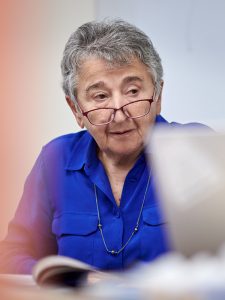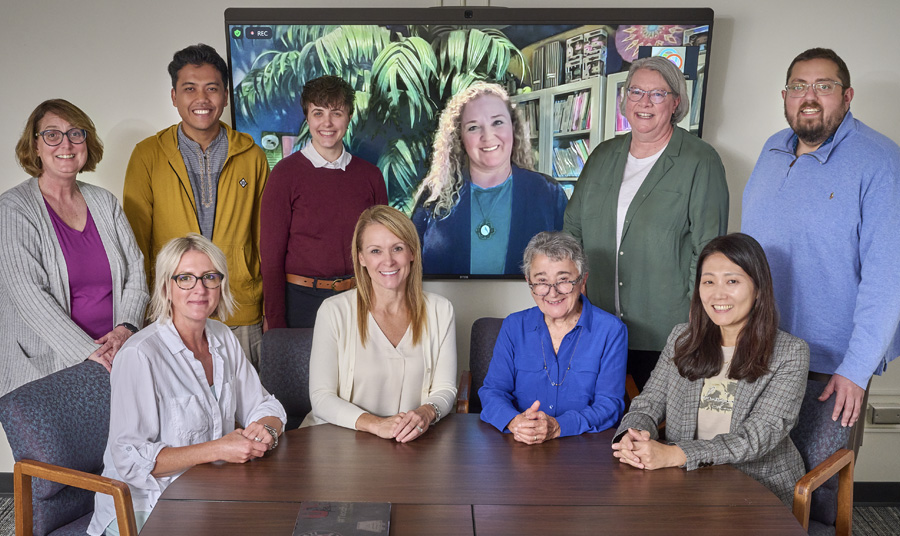Michigan State University and Lab-Aids reach exclusive deal to publish fourth generation of the Connected Math Project
The Connected Mathematics Project (CMP) is set to begin an exciting new chapter in its transformative history, now that Michigan State University (MSU) and Lab-Aids have formed an exclusive partnership to publish the fourth edition of its curriculum, Connected Mathematics4 (CMP4), a complete middle school mathematics curriculum.
Developed at MSU with support from the National Science Foundation, the award-winning CMP curriculum is widely used in middle school classrooms across the United States and several different countries. Based in Ronkonkoma, New York, a suburb of New York City, Lab- Aids develops, manufactures, and publishes curriculum and supplementary programs that help students better understand science concepts through direct experience.
“We’re opposed to the ‘stand and deliver’ method,” said Jonathan Atkins, President of Lab-Aids. “We don’t believe math or science, or quite frankly, many subjects, should be taught that way. When the teacher just dictates, and the students just take notes, and a student goes back and regurgitates it, there is no true learning or understanding. Students must have relevancy. They’ve got to see how math can be used in the real world to solve problems. This guiding principle is what can help motivate them to become effectual, productive citizens in whatever endeavors they pursue in the workplace.”
“A problem-centered curriculum not only helps students to make sense of the mathematics, it also helps them to process the mathematics in a retrievable way. Learning is enhanced if it is connected to prior knowledge and more likely to be retained and applied to future learning.”
— ELIZABETH DIFANIS PHILLIPS, CMP author and Senior Academic pecialist in the Program in Mathematics Education
“There’s a reason there are science labs in schools,” he added. “Science is hands-on. But to apply that philosophy to math and really create hands-on math instructional curriculum, guidelines, and ways to teach, is quite unique. So that’s what was most appealing to us about CMP4.”
The fundamental design principles of the CMP reflect the authors’ core beliefs and research about effective teaching and learning of mathematics. Connected Mathematics is a contextualized, problem-based middle grades mathematics curriculum. As articulated by the authors, “Students can make more sense of mathematics if the concepts and skills are embedded within a contextual problem. If time is spent exploring the challenge and the embedded mathematics in the problem, reflecting on solution strategies, examining why they work, comparing strategies, and relating them to those used in previous situations, then students are likely to build more robust understandings of mathematical concepts and related procedures.”

Elizabeth Difanis Phillips, CMP author and Senior Academic Specialist in the Program in Mathematics Education and co-author Glenda Lappan, MSU Emerita University Distinguished Professor assert that “A problem-centered curriculum not only helps students to make sense of the mathematics, it also helps them to process the mathematics in a retrievable way. Learning is enhanced if it is connected to prior knowledge and more likely to be retained and applied to future learning.”
“We think there’s only a handful of big ideas in math that are important to learn in middle school,” Difanis Phillips explained. “We identified these ideas. We unpacked the understanding and then repackaged these understandings as sequences or conjectural problems. CMP4 is not just about getting it right. It reflects the way you learn. You have a problem. You have to figure out how to solve that problem. Then you have to explain what you learned in the process. Students have to identify three things in their summary: What strategies did you use? What was the embedded mathematics you used today? How does that connect to what you learned yesterday?”
Difanis Phillips points out that CMP4 is the most researched mathematics curriculum in the history of mathematics education with over 500 research articles and 70 doctoral dissertations. She says CMP found a partner, not merely a publisher, with Lab-Aids, since their shared approach to problem-solving gives them the impetus to continually exchange ideas with each other.
What both sides bring to the negotiating table
According to Anne Di Sante, Executive Director of MSU Technologies (MSUT), what MSU brings to the table in reaching successful licensing agreements is the ability to act as a catalyst to successfully transfer technology from academia to the marketplace.
“We help catalyze and move these technologies out of the university into the hands of an entity that can invest resources and turn whatever we have into a product,” said Di Sante. “Most of the technology that the university has is at an early stage. CMP4 is actually quite advanced compared to most of the technologies that we deal with. But even with CMP4, it requires an investment of resources to get it to be product-ready, and that’s what these partners, our licensees, do.”
CMP was originally marketed and published through Pearson Education, who handled earlier generations of the product until Pearson was acquired by another K-12 learning company. When the new company opted to move forward with an internal product offering, MSUT reached out to potential publishers who were either in the math or science space to see if there was any interest in incorporating CMP4 into their product line.
Mr. Atkins says Lab-Aids brings 60 years of experience in hands-on, evidence-based science programs to the partnership, as well as a customer base that stretches across the globe.
“We’ve seen tons of companies be absorbed who don’t have the benefits of being the boutique size we are with our experience and customer base,” Mr. Atkins said. “Tens of thousands of customers who know and trust us in science. And vice versa. There are many educators who know and trust CMP, and the fact they’re working with us is probably going to make them take a closer look at our science products. We both come to the table with some unique synergy to help each other out, to be ‘ying’ to each other’s ‘yang’, if you will.”
“We help catalyze and move these technologies out of the university into the hands of an entity that can invest resources and turn whatever we have into a product.”
— ANNE DI SANTE, Executive Director of MSU Technologies
Brian Copple, MSUT Technology Manager for the CMP deal, agrees. He says the philosophical alignment between CMP and Lab-Aids proved to be key in bringing the two sides together.
“The best fit we found was with Lab-Aids, who was entrenched in curriculum for middle school science and was interested in expanding into the math space,” he said. “With CMP4, we did a lot of work looking at a number of different pathways, including the traditional publishing route and also creating a startup company to commercialize it. Principal investigators (PI) typically are good at the research, publishing articles and optimizing the curriculum. But the business end of things is usually not their strength, which is understandable. So that’s where we come in to fill the gap—to find the optimal commercial partner.”
MSUT was also able to get trademark protections on some specific pedagogies associated with CMP. One is the “Arc of Learning” framework, which describes how learning develops over time through a unit when the mathematics are embedded in a problem.

From product development to product launch
Lab-Aids will publish both print and electronic versions of CMP4 in August of 2024. The company is ramping up product development, hiring and building teams to get the CMP4 platform up and running smoothly. Feedback about CMP4’s many new features has been extremely positive from the more than 500 teachers involved in the three-year field test.
Mr. Atkins says he and the rest of the Lab-Aids team are excited to launch CMP4 and how much they appreciate the enthusiasm and engagement level of the CMP4 authors. While there can often be a dichotomy between academia and business in licensing negotiations, Mr. Atkins describes the experience of working with MSUT on the contract as “outstanding.”
“We’ve been working with university systems as author groups for decades,” Mr. Atkins said. “I have not had a university group so in tune with the business side of tech transfer. MSU Technologies just gets it. It was very refreshing to work with an organization that understood, from our perspective, the things we needed to get our part of the job done.”


